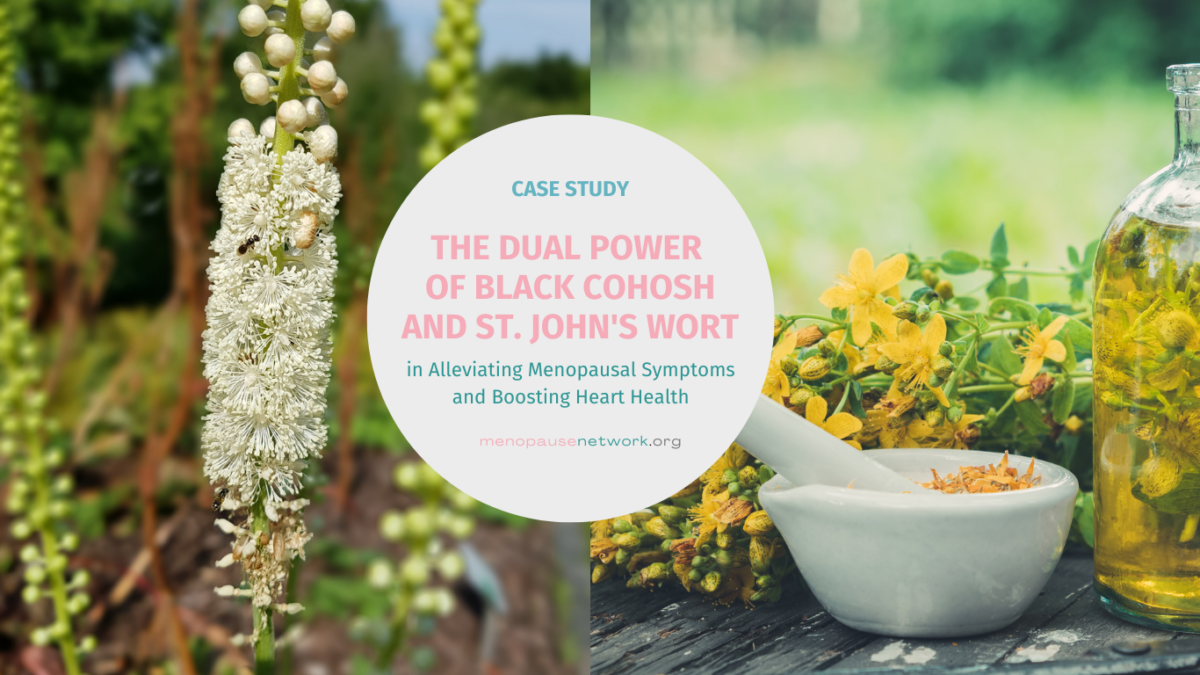The Dual Power of Black Cohosh and St. John’s Wort in Alleviating Menopausal Symptoms and Boosting Heart Health

A study1 published at the National Library of Medicine focused on the effects of two natural herbs, black cohosh and St. John’s wort, on symptoms commonly experienced by women during menopause, often referred to as climacteric symptoms. These symptoms can include hot flashes, mood swings, and other physical and emotional changes. Traditionally, women have turned to hormone therapy to manage these symptoms. However, concerns about potential side effects, like an increased risk of breast cancer, have led many to seek natural alternatives.
In this research, 89 women going through menopause were divided into two groups. One group was given a combination of black cohosh and St. John’s wort, while the other received a placebo, which is essentially a sugar pill with no therapeutic effect. The study lasted for 12 weeks, and the women’s symptoms were regularly assessed using a standard measure called the Kupperman Index.
The results were promising. Women who took the herbal combination reported a significant reduction in their menopausal symptoms, especially hot flashes, compared to those on the placebo. Additionally, there was an interesting observation related to cholesterol. The “good” cholesterol (HDL) levels in the herb-taking group slightly increased, which is a positive sign for heart health.
In simple terms, the combination of black cohosh and St. John’s wort seems to offer relief from menopausal symptoms and might even have a beneficial effect on cholesterol levels. This suggests that these herbs could be a natural alternative for women seeking relief from menopausal symptoms without resorting to traditional hormone therapy. However, as with all treatments, it’s essential to consult with a healthcare professional before making any decisions.
What does this study mean for women?
This study offers valuable insights for women and their families, especially those going through menopause and experiencing its associated symptoms:
- Natural Alternatives: The research suggests that there are potential natural alternatives to hormone therapy for managing menopausal symptoms. Black cohosh and St. John’s wort, when combined, appear to effectively reduce common symptoms like hot flashes.
- Safety Concerns: Many women have been hesitant to use hormone therapy due to associated risks, such as an increased chance of breast cancer. The combination of black cohosh and St. John’s wort might provide a safer option for those looking for relief without the potential side effects of hormone treatments.
- Heart Health Benefits: Beyond just alleviating menopausal symptoms, the study indicates that this herbal combination might have a positive impact on heart health. The increase in “good” cholesterol (HDL) levels in women taking the herbs is a promising sign, as higher HDL levels are generally associated with a lower risk of heart disease.
- Holistic Approach: The study also underscores the importance of considering both physical and psychological aspects of menopause. St. John’s wort, traditionally used for mild to moderate depression, addresses the emotional and mood-related symptoms that many women experience during this phase.
- Further Research Needed: While the results are promising, it’s essential to note that more extensive studies are needed to confirm these findings and understand any long-term effects fully.
For women (and their families) navigating the challenges of menopause, this study offers hope for a natural, potentially safer way to manage their symptoms and improve their overall well-being. However, it’s always crucial for individuals to consult with healthcare professionals before starting any new treatment or therapy.
1Chung DJ, Kim HY, Park KH, Jeong KA, Lee SK, Lee YI, Hur SE, Cho MS, Lee BS, Bai SW, Kim CM, Cho SH, Hwang JY, Park JH. Black cohosh and St. John’s wort (GYNO-Plus) for climacteric symptoms. Yonsei Med J. 2007 Apr 30;48(2):289-94. doi: 10.3349/ymj.2007.48.2.289. PMID: 17461529; PMCID: PMC2628120. | Copyright © 2007 The Yonsei University College of Medicine
